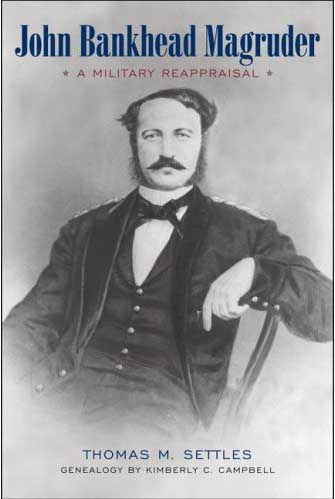John Bankhead Magruder: A Military Reappraisal
It would be hard to imagine a more vivid biographical subject than John Bankhead Magruder. The colorful, emotional and controversial Confederate general, a notable figure during the Army of Northern Virginia’s 1862 defense of Richmond, makes for a gorgeous study.
Thomas Settles paints Magruder in bright hues in his new biography. One complaint might be that he expresses excessive sympathy in evaluating the general’s actions during his renowned meltdown in the midst of the Seven Days’ Campaign, but that cannot squelch my admiration for a good book based on rich sources. Magruder’s meltdown looms particularly large in Settles’ study, which is understandable perhaps, since nothing else in his career resonates so strongly.
 The general’s erratic behavior during the Seven Days’ prompted intervention from his personal staff. Settles mentions one staffer, Asbury Coward (misspelled “Ashbury” in the book), but does not cite Coward’s memoir, which described Magruder’s “wild gesture[s]” and demeanor “frantic with excitement.” One observer reported in a July 11, 1862, letter that the general “acted…like a madman,” and another noted Magruder’s “terrible excitement” and “wild expression,” but Settles surprisingly does not include these accounts in the biography.
The general’s erratic behavior during the Seven Days’ prompted intervention from his personal staff. Settles mentions one staffer, Asbury Coward (misspelled “Ashbury” in the book), but does not cite Coward’s memoir, which described Magruder’s “wild gesture[s]” and demeanor “frantic with excitement.” One observer reported in a July 11, 1862, letter that the general “acted…like a madman,” and another noted Magruder’s “terrible excitement” and “wild expression,” but Settles surprisingly does not include these accounts in the biography.
Many contemporaries believed Magruder’s bizarre behavior that week originated in a whiskey cask. Before the war, and then after, Magruder drank enough to cause comment. Settles reports amusing drunken episodes from both periods, but according to reliable evidence, Magruder likely honored an early war temperance pledge. His peculiar behavior in June-July 1862 resulted instead from a chronically frenetic temperament, exacerbated by medically administered opiates and lack of sleep.
By any reasonable standard, Magruder did a poor job tactically in the campaign, but apparently not under the influence of strong drink. Rather he operated, by his own admission, in a brittle state.
Settles insists that Adjutant and Inspector General Samuel Cooper, as well as other Confederate officials, simply disliked Magruder. In their opinion, the ideal modern major general simply could not function when “frantic” and “wild.” According to Settles, noted historian Douglas Southall Freeman, who chronicled Robert E. Lee’s commanders in Lee’s Lieutenants, improperly absorbed their slant in his own evaluation of Magruder. It is easy to imagine the impact of his antics on Lee, whose devotion to calm self-control was legendary. No matter that Magruder’s avidly theatrical style had famously confounded the timid George McClellan in the spring 1862 Peninsula Campaign; it bore no fruit in full-fledged combat.
To cover Magruder’s intriguing prewar career, Settles used manuscript sources at the National Archives that have too often been ignored by biographers. In fact, this portion of the book might be a model for the genre, but for some reason he neglected similar files to describe Magruder’s Confederate years. Even so, this is a first-rate book on a fascinating topic.




